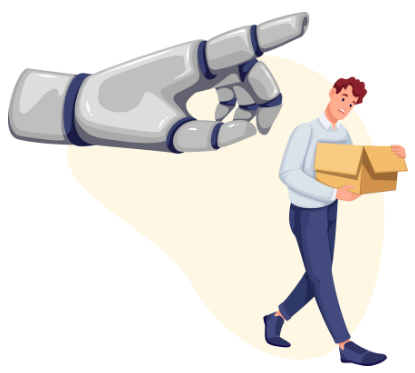Unless you're living in a bubble, there's no way you haven't heard about the monumental tech innovation that bought shockwave to the globe called ChatGPT. Since its launch in November 2022, this AI phenomenon has raised many eyebrows for boon and bane rationality.
With a revolutionary change in the tech industry, ChatGPT uses AI tools to generate human-like content, from creating content and writing essays to generating debugging codes in a jiffy.
However, ChatGPT also tagged along a massive threat for various roles, with a scare of eating millions of jobs across borders. But is that true & which occupations are at risk genuinely? If not, then why aren’t you at risk? Let’s find out.
- 1. Media Industry: If you’re a technical writer, content creator, or into advertising, your job is amendable post the introduction of ChatGPT! Its ability to produce a lot of good content, analyze it & interpret data is phenomenal. Moreover, it can generate high-quality translations in different languages quickly.
- 2. Financial Services: With the accelerated use of digital finance & robo-advisors, AI Integration into Financial Services is rapidly growing. Thus, the jobs of Financial Advisors, Financial Analysts are fraught with danger. ChatGPT can access data, identify ongoing market trends, and pick better-performing portfolios for investors
- 3. Technical Fields: The roles at the most risk are undoubtedly that of tech enthusiasts like Coders, Web Developers, Software Engineers, and Computer Programmers. ChatGPT can not only formulate the kind of work these professionals do in a lesser time frame but also diminish the scope of human error
- 4. Education System: With ingress to the cross-level syllabus and subjects, AI using ChatGPT can also substitute the place of teachers and professors in schools and colleges. Moreover, with the encyclopedia of knowledge accessible by the AI tool, ChatGPT can quickly deliver classes and teach students of every board or university.
- 5. Legal Services: Legal services are not limited to lawyers and judges but include legal assistants and paralegals as well, and these roles are automatable. Therefore, including ChatGPT in legal services can maximize the productivity of these services. Furthermore, as the data is structured and obtains legal language, it becomes amendable.
Although irrespective of how much ChatGPT is advocated on various grounds, it can never replace the place of a human mind. With machines, software, and tools, the chances of it being dangerous are startlingly high. ChatGPT lacks morals based on human judgment, absence of creativity, ability to write malware, and can redefine market terms—reasons why it cannot substitute professionals from their roles.
Nevertheless, optimal utilization of ChatGPT can enhance productivity, efficiency and contribute to time management.
